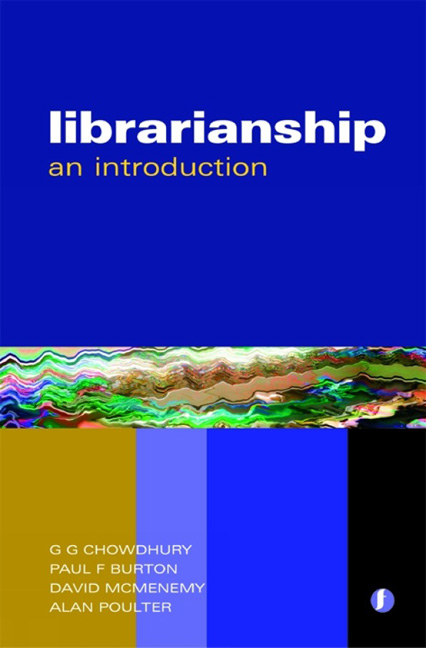Book contents
- Frontmatter
- Contents
- Preface
- Acknowledgements
- 1 Introduction
- Part 1 Libraries and information services: evolution or revolution?
- Part 2 Library and information resources and services
- Part 3 Information organization and access
- Part 4 Library and information users and society
- Part 5 Library technologies
- Part 6 Management and marketing in libraries
- Part 7 Education and research in librarianship
- 25 Education in librarianship
- 26 Research in librarianship
- Epilogue
- Glossary
- Resource list
- Index
25 - Education in librarianship
from Part 7 - Education and research in librarianship
Published online by Cambridge University Press: 08 June 2018
- Frontmatter
- Contents
- Preface
- Acknowledgements
- 1 Introduction
- Part 1 Libraries and information services: evolution or revolution?
- Part 2 Library and information resources and services
- Part 3 Information organization and access
- Part 4 Library and information users and society
- Part 5 Library technologies
- Part 6 Management and marketing in libraries
- Part 7 Education and research in librarianship
- 25 Education in librarianship
- 26 Research in librarianship
- Epilogue
- Glossary
- Resource list
- Index
Summary
Introduction
Education and training in modern librarianship began in the USA in the late 19th century and gradually spread there and to other countries in the world. Today formal education in librarianship is usually offered at the postgraduate level at universities throughout the world, though there are some undergraduate programmes too. The duration, content and nomenclature of the university courses vary significantly from one country to another, and even within the same country. However, on-the-job training and CPD programmes also play a major part in keeping library professionals up to date with the professional as well as technical developments that have an impact on the profession and the user community, and society at large. This chapter provides a brief history of library education, and an outline of the content and structure of various university courses in librarianship. It also provides a brief introduction to the concept of CPD and training programmes offered by various professional associations and organizations. The objective is to provide an overview of the nature and characteristics of education and training in librarianship in different parts of the world.
Education in librarianship: a brief history
Formal education in modern librarianship began in the late 19th century in the USA with the foundation of the School of Library Service in New York State University and subsequently at Columbia University by Melvil Dewey, and it remained an American phenomenon until after the First World War (Feather, 1997). These continued as mainly rather low-level training programmes until the 1920s when the research-led Graduate School of Library Science was established at the University of Chicago. In time several graduate programmes in librarianship were introduced at various American universities, and these courses were accredited by the American Library Association (ALA). The first formal course in librarianship in Canada was established in 1904 at McGill University, though it, like those in other North American universities, remained a rather low-level course until 1929, when an ALA-accredited diploma programme was introduced, and subsequently an ALA-accredited bachelor's programme began in 1931.
- Type
- Chapter
- Information
- LibrarianshipAn introduction, pp. 277 - 284Publisher: FacetPrint publication year: 2007



